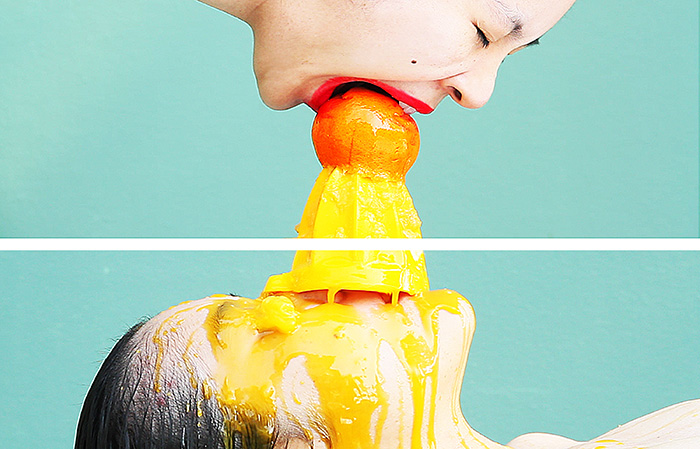Kawita Vatanajyankur – Work
Press Release
In association with Head On Photo Festival, Stills is proud to present one of the most exciting new contributors to Asian-Pacific video art, Thai-Australian Kawita Vatanajyankur, and her arresting new series Work (2015).
Endurance art has rarely been so pretty. Alluring luminous yellows, citrus greens and bubblegum pinks are distinctive of the artist’s aesthetic—a visual language of consumption and desire that speaks to a world of instant gratification and flattened complexity. However, this heightened superficiality lures you in only to confound your expectations—Vatanajyankur’s videos offer a powerful examination of the psychological, social and cultural ways of viewing and valuing women’s everyday labour.
In the four videos comprising Work (2015), Vatanajyankur presents an uncanny restaging of a local, fresh fruit market. Engaging the tools and tasks common to its workers, including weighing bananas, juicing oranges and precariously balancing watermelons in plastic crates, Vatanajyankur undertakes physical experiments that playfully, and often painfully, test her body’s limits. In Carrying Pole (2015), for instance, bananas are thrown into woven baskets that hang off her body, which is suspended from string like a set of scales. But as the fruits pile up, and in turn weigh her down, this scale works to gauge the artist’s physical and mental strength; a challenge that is both unavoidably compelling, and uncomfortable to watch, in—excuse the pun—equal measures.
Vatanajyankur’s exploration of everyday and domestic work is particularly telling of her Thai homeland. A place where, for many, daily chores aren’t always assisted by electronic contraptions or white goods but are time-consuming, physically exhausting, and often the task of women. The videos’ happy, day-glow colours, dark humour and undercurrents of violence, however, bring a universality and contemporary currency to the historical trajectory of feminist art. It is telling, for instance, that she describes her performances as “meditation postures”, when such gruelling tests of resilience and fear are quite the opposite of what we might think of now as zen. But, for Vatanajyankur, extreme physical endurance offers a way to free herself from her mind: a mechanism to lose her sense of being. This deliberate objectification, she says, turns her body into sculpture.
Like her previously acclaimed works, this powerful new series intersects the long histories of ritual, craft and performance with the relatively new medium of video, as a way to redress how women’s work has been considered a lesser form of creativity, than the ‘fine arts’ not long ago epitomized by literally man-made representations of the female body. Uniquely, Vatanajyankur’s work is accessible and visually appealing: substantial in its conceptual rigour, and, at the same time, entertaining. Its lasting effect resonates deeply by asking probing questions; what are the limitations of our bodies, the continuing challenges of mundane labour, and the ongoing tasks for feminism in a globalized and digitally networked world?
Born in Thailand, Vatanajyankur graduated in BA Fine Art from RMIT University Melbourne, 2011. Receiving critical acclaim early in her career, her work has featured in numerous national and international exhibitions including, in 2014, PROXIMITY, a Bangkok Art and Culture Centre's touring exhibition, National Museum, Poland; Stills Gallery @ Melbourne Art Fair; and in 2013, The Encyclopedic Palace: Melbourne Offsite for the 55th Venice Biennale, with Platform Contemporary Art Space, Melbourne; BorderBody, MECA, Spain, and Gallery MD_S, Poland; Ikono On Air Festival, Germany; and Channels: The Australian Video Art Festival, Federation Square, Melbourne. In 2014, her work featured on the cover of Australian Art Collector.


